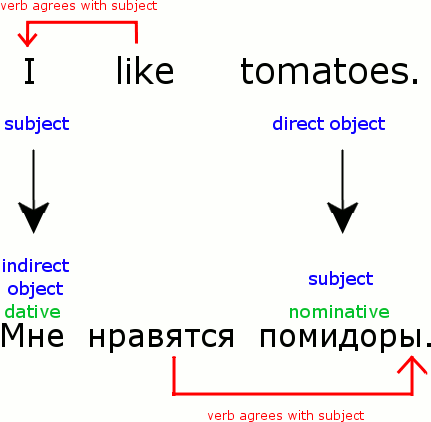Нравиться/понравиться (часть первая)
In English we often say things like “I like tomatoes.” To express the same idea in Russian we use the verb нравиться/понравиться, but the verb does not mean ‘like’. Before we discuss its usage, let's look at its conjugation. Note that it is a reflexive verb:
| Imperfective | Perfective | |
| Infinitive | нравиться | понравиться |
| Past | нравился нравилась нравилось нравились |
понравился понравилась понравилось понравились |
| Present | нравлюсь нравишься нравится нравимся нравитесь нравятся |
No such thing as perfective present in Russian. |
| Future |
буду нравиться будешь нравиться будет нравиться будем нравиться будете нравиться будут нравиться |
понравлюсь понравишься понравится понравимся понравитесь понравятся |
| Imperative | Not generally used | |
Нравиться literally means “to please/be pleasing,” so to communicate the ‘like’ idea, you have to mentally rephrase “I like tomatoes” as “Tomatoes please me”. Notice this is grammatically quite different than the analogous English sentence. In English the person experiencing the pleasure is the subject of the sentence, and the source of the pleasure is the direct object:

In Russian the source of the pleasure is the subject of the sentence, which means it appears in the nominative case. The verb, of course, agrees with the subject. The person experiencing the pleasure is the indirect object and appears in the dative case:

Thus when one person likes another, we can have sentences like these:
| Ты нравишься мне. | I like you. Lit. You are pleasing to me. |
| Я нравлюсь тебе. | You like me. Lit. I am pleasing to you. |
There is one last quirk. In the Russian sentence, the source of pleasure often (though not always) shows up in final position, just as in the English sentence, even though grammatically it is the subject. Notice that the verb agrees with the subject in the Russian sentence, even though the subject is at the end of the sentence:

Here are some present tense sentences. Notice carefully the case of each subject and object, and how the verb agrees with the subject:
| Глебу нравятся блины. | Gleb likes crepes. |
| Анне нравится шоколад. | Anna likes chocolate. |
| Детям нравится мороженое. | Children like ice cream. |
| Нам нравится японская кухня. | We like Japanese cuisine. |
Now let's look at those same sentences in the past tense. Note how the verb agrees with the subject:
| Глебу всегда нравились блины. | Gleb always liked crepes. |
| Анне всегда нравился шоколад. | Anna always liked chocolate. |
| Детям всегда нравилось мороженое. | The children always liked ice cream. |
| Нам всегда нравилась японская кухня. | We always liked Japanese cuisine. |
2 comments
This construction fascinates me, and I never quite get used to it but it does seem to be the norm throughout european languages-gefallen in German, plaire in French, piacere in Italian, podobać in Polish. It seems that English is the exception with the idea of liking being a transitive verb. The idea of loving something however, seems to be universally transitive .
Form is loading...